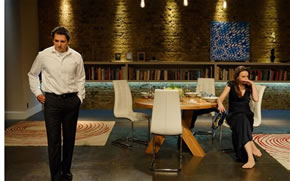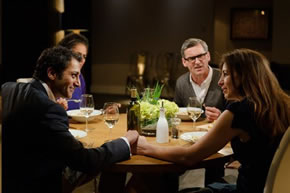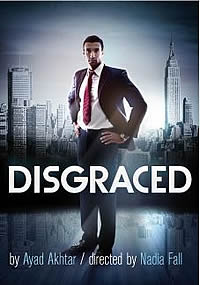Disgraced's Disastrous Dinner Party Comes to the Bush Theatre
Pulitzer prize-winning play is a flawed but important work, writes Penny Flood
Take two men, a Jew and a Muslim and two women, one black, one white; add lots of whisky; top up with infidelity, ambition, back-stabbing and brutal truth telling, along with a few lies, and you’ve got a cocktail for an explosive dinner party that is going to end in disaster.

Ayad Akhtar’s play is set in New York’s fashionable East Side. Amir (Hari Dhillon) is a successful lawyer but to get to where he is he has blurred the details of his background. His wife Emily (Kirsty Bushell) is an up and coming artist whose latest work has espoused the Islamic tradition. Isaac (Nigel Whitmey) is Jewish and the curator of the Whitney Art Gallery, where he plans to exhibit some of Emily’s paintings. His African-American wife Jory (Sara Powell) works for the same company as Amir.
The party starts out as a celebration of Emily’s success but soon descends into something nasty as underlying emotions and home truths are revealed. The participants’ mix of backgrounds is interesting, and Akhtar’s sharp writing allows for strong arguments and discussions to develop, including much humour. But it always comes back to Islam and the difficulties Amir has in fitting in.

Akhtar is writing from the heart. He is an American-born, first generation Pakistani-American from Milwaukee, Wisconsin. That’s what makes the arguments and points of view so interesting.
Emily sees Islam as a source of artistic inspiration and she’s incorporated it into her latest work which Isaac loves. Amir, on the other hand has ambiguous feelings about Islam. He generally sees it as backward and confesses to being an apostate, but he can’t reject it altogether. The tensions within him are at the core of a dramatic climax to the party
Amir’s conscience comes in the form of Abe (Danny Ashok), his nephew – an all American youngster who has changed his name from Hussein (the Koran permits name changes if it makes your life easier, he explains). He fits in better but he hasn’t rejected his roots either, and he comes to Amir to ask for help for an imam who is in prison for raising funds for Hammas. Abe turns up again later on having changed his name back to Hussein and on the verge of becoming a fundamentalist.
Disgraced won the 2013 Pulitzer Prize for Drama but for me, sometimes there seemed to be too much going on. There are big points being made here: how does Amir cope as a middle class lawyer when he secretly harbours both pride and shame about his Muslim and American roots? And this is sometimes almost obscured by side issues such as the affair, the imam and Abe.
This issue of Muslim identity was brilliantly aired in Ishy Din’s Snookered at The Bush early last year, but that was working class lads in the north of England. Disgraced takes a different angle, that of middle class professionals in America, and I would have preferred it to have been done more thoughtfully with less of the shouting.
But, in spite of that it’s an important work offering complex points of view about art, religion and race that you may not have thought about before. It may not be perfect but it does open a window onto a world so many of us know so little about offering a new perspective on an old problem and, now of all times, that can’t be a bad thing.
Disgraced is at The Bush until June 29.
Book online or call 020 8743 5050.
May 24, 2013
